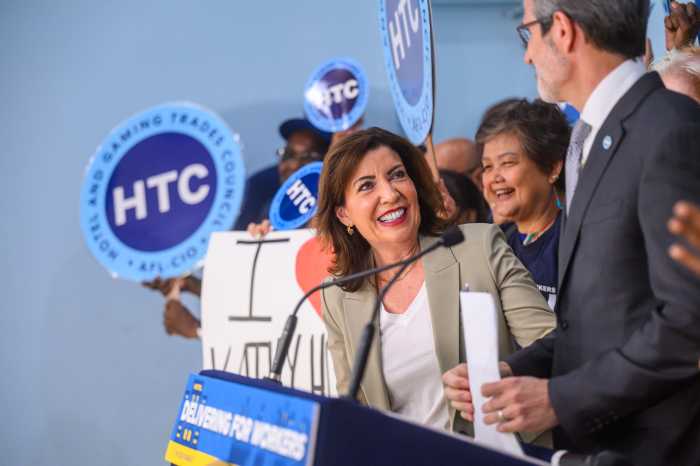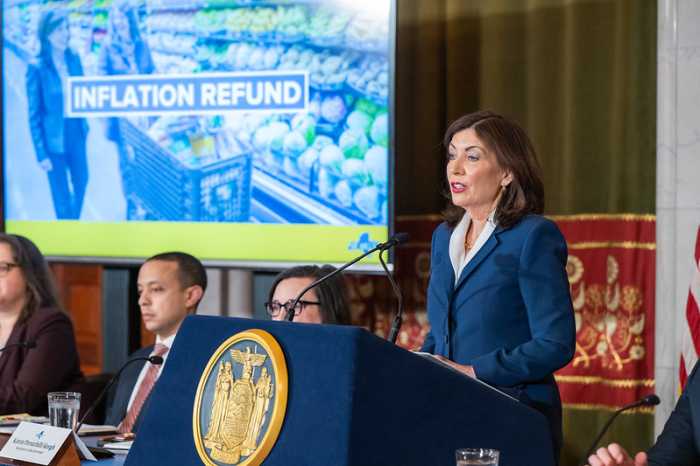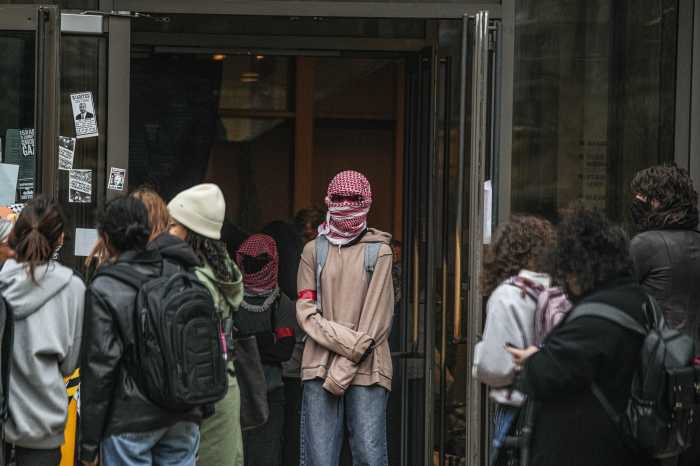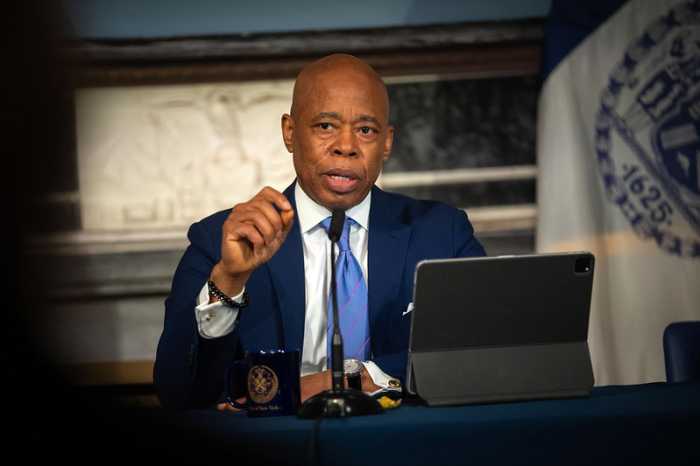The state Senate and Assembly on Tuesday rolled out their budget plans for Fiscal Year 2025 — proposals that rebut key elements of Governor Kathy Hochul’s $233 billion executive budget and put forward some of their own bold policy items.
The plans — known as “one-house budgets” — include a rejection of Hochul’s changes to the state’s public school funding formula, an increase in taxes on the wealthy and new proposals for building affordable housing and protecting tenants.
The one-house resolutions’ release sets the stage for state budget negotiations over the next couple of weeks — with a final plan due April 1.
State Senate Majority Leader Andrea Stewart-Cousins, during a Tuesday news conference in the state Capital in Albany, called the upper chamber’s budget plan a “blueprint for a more affordable, equitable and prosperous New York.”
“Our budget is a reflection of our commitment to the hard-working families of our state,” she continued. “It’s designed to restore and enhance funding across critical sectors, from education to housing to health care to economic growth and beyond. It’s a budget that will lift up working and middle-class families.”
The governor declined to weigh-in on the legislature’s proposals when asked about them by a reporter during a March 12 press conference.
“You’ll not hear from me any element that I’ll be negotiating until it is settled,” Hochul told reporters.
Both houses of the legislature want Hochul to abandon her proposed changes to the state’s public school funding formula — known as “foundation aid” — that would reportedly result in a $420 million funding reduction that would leave many school districts across the state receiving significantly less money. Lawmakers are also proposing a study on how to change the funding model going forward.
Melinda Person, president of New York State United Teachers — a key teacher’s union that has been beating the drum on reversing the cuts since Hochul released her budget plan, applauded the lawmakers for championing a restoration of the funding.
“We thank the Senate and Assembly for making it clear that our students, educators and schools are a top priority,” Person said, in a statement. “Great things are happening in our public schools, and in New York we are united across party lines and legislative chambers to support them with the resources they need.”
Additionally, both chambers left a four-year extension of mayor control of public schools out of their proposals. Hochul has signaled support for the extension, which is a top priority of Mayor Eric Adams this budget cycle.
Legislators also proposed raising personal income taxes on New York’s highest earners as well as increasing the corporate tax rate. They are pitching increases from 10.3% to 10.8% for those making between 5 million and $25 million annually and from 10.9% to 11.4% for filers earning over $25 million a year between tax years 2024 and 2027.
Lawmakers argue the tax increase is crucial for raising direly needed revenue to fund critical state programs.
“It’s a very small number of New Yorkers,” said state Senate Finance Committee Chair Liz Krueger (D-Manhattan). “We do not believe it will have a negative impact on their lives, or their incomes, or their policy positions about being New Yorkers and having an understanding of how crucial it is for New York to have the money it needs to continue to have a solid infrastructure, quality air and water and educated workforce.”
Under the proposal, the corporate tax rate would jump up from 7.25% to 9% through tax year 2026.
But Hochul, who did not include tax increases in her budget, on Tuesday called the proposals a “non-starter.”
The state Senate also put forward a bold plan to boost housing production through a new public benefit corporation dubbed the “New York Housing Opportunity Corporation.” The proposed entity would utilize $250 million in funding to build new affordable housing on state-owned land. It is being billed as a successor to the Mitchell-Lama program that operated a half century ago.
Albany’s upper chamber also signaled support for tenant protections that “align with the core principles” of so-called “Good Cause Eviction” legislation — a measure that would cap rent increases for rent-regulated apartments and limit landlords’ ability to evict tenants. The Senate wants to tie those protections to a new affordable tax incentive, which would replace the expired 421-a program, desired by both Hochul and Adams.
“We want a holistic approach to housing,which does include tenant protections,” Stewart-Cousins said. “And when we talk about the principles of Good Cause, we’re talking about making sure that people have a reasonable way to stay in their homes without onerous or difficult circumstances.”





























